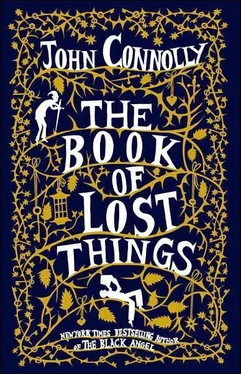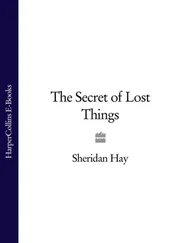“Who would do such a thing?” he asked.
“A trickster,” said the Woodsman. “A crooked man in a crooked hat.”
“But why?” said David. “Why didn’t he just take away the string that you had tied. Wouldn’t that have worked just as well?”
The Woodsman thought for a moment before answering. “Yes,” he said, “but it wouldn’t have been so amusing to him, and it wouldn’t have made such a good story.”
“A story?” asked David. “Whatever do you mean?”
“You’re part of a story,” said the Woodsman. “He likes to create stories. He likes to store up tales to tell. This will make a very good story.”
“But how will I get home?” asked David. Now that his means of returning to his own world was gone, he suddenly wanted very much to be there, whereas when it had seemed that the Woodsman was trying to force him to return against his will, David had wanted nothing more than to stay in the new land and look for his mother. It was all very peculiar.
“He doesn’t want you to get home,” said the Woodsman.
“I’ve never done anything to him,” said David. “Why is he trying to keep me here? Why is he being so mean?”
The Woodsman shook his head. “I don’t know,” he said.
“Then who does?” said David. He almost shouted in frustration. He was starting to wish there was someone around who knew a little more than the Woodsman. The Woodsman was fine for decapitating wolves and giving unwanted advice, but he didn’t seem to be keeping up with developments in the kingdom.
“The king,” said the Woodsman at last. “The king might know.”
“But I thought you told me that he wasn’t in control anymore, that no one had seen him in a long time.”
“That doesn’t mean he isn’t aware of what’s happening,” said the Woodsman. “They say that the king has a book, a Book of Lost Things. It is his most prized possession. He keeps it hidden in the throne room of his palace, and no one is permitted to look upon it but him. I have heard it said that it contains in its pages all of the king’s knowledge, and that he turns to it in times of trouble or doubt to give him guidance. Perhaps there is an answer within it to the question of how to get you home.”
David tried to read the expression on the Woodsman’s face. He wasn’t sure why, but he had a strong feeling that the Woodsman wasn’t telling him the entire truth about the king. Before he could question him further, the Woodsman tossed the sack containing David’s old clothes into a copse of bushes and started to walk back in the direction they had come.
“It will be one fewer thing to carry on our journey,” he said. “We have a long way to go.”
With a last, longing look at the forest of anonymous trees, David turned and followed the Woodsman back to the cottage.
When they were gone, and all was quiet, a figure emerged from the beneath the spreading roots of a great and ancient tree. Its back was hunched, its fingers were twisted, and it wore a crooked hat upon its head. It moved quickly through the undergrowth until it came to a copse of bushes dotted with swollen, frost-sweetened berries, but it ignored the fruits in favor of the rough, dirty sack that lay amid the leaves. It reached inside, removed the top of David’s pajamas, and held the clothing to its face, sniffing deeply.
“Boy lost,” it whispered to itself, “and child lost to come.”
And with that it grabbed the sack and was swallowed up by the shadows of the forest.
XI. Of the Children Lost in the Forest and What Befell Them
DAVID AND THE WOODSMAN returned to the cottage without incident. There they packed food into two leather bags and filled a pair of tin canteens from the stream that ran behind the house. David saw the Woodsman kneel by the water’s edge and examine some marks upon the damp ground, but he said nothing to David about them. David glanced at them in passing and thought that they looked like the tracks left by a big dog, or a wolf. There was a little water at the bottom of each, so David knew that they were recent.
The Woodsman armed himself with his ax, a bow and a quiver of arrows, and a long knife. Finally, he took a short-bladed sword from a storage chest. After only the slightest pause to blow some of the dust from it, he gave the sword to David, and a leather belt upon which to wear it. David had never held a real sword before, and his knowledge of swordsmanship did not extend much further than playing pirates with wooden sticks, but having the sword at his side made him feel stronger and a little braver.
The Woodsman locked the cottage, then laid his hand flat upon the door and lowered his head, as though praying. He looked sad, and David wondered if, for some reason, the Woodsman thought that he might not see his home again. Then they moved into the forest, heading northeast, and kept up a steady pace while the sickly luminescence that passed for daylight lit their way. After a few hours, David grew very tired. The Woodsman allowed him to rest, but only for a little while.
“We must be clear of the woods before nightfall,” he told David, and the boy did not have to ask him why. Already he feared to hear the silence of the woods shattered by the howling of wolves and Loups.
As they walked, David had a chance to examine his surroundings. He was unable to name any of the trees that he saw, although aspects of some were familiar to him. A tree that looked like an old oak had pinecones dangling beneath its evergreen leaves. Another was the size and shape of a large Christmas tree, the bases of its silver leaves dotted with clusters of red berries. Most of the trees, though, were bare. Occasionally, David would catch sight of some of the childlike flowers, their eyes wide and curious, although at the first sign of the approaching Woodsman and boy, they would draw their leaves protectively around themselves and quake gently until the threat had passed.
“What are those flowers called?” he asked.
“They have no name,” said the Woodsman. “Sometimes, children stray from the path and become lost in the forest, and they are never seen again. They die there, consumed by beasts or slain by evil men, and their blood soaks into the ground. In time, one of these flowers will spring up, often far from where the child breathed his last. They cluster together, just like frightened children might. They are the forest’s way of remembering them, I think. The forest feels the loss of a child.”
David had learned that the Woodsman generally did not speak unless spoken to first, so it was left to him to ask questions, which the Woodsman would answer as best he could. He tried to give David some sense of the geography of this place: the king’s castle lay many miles to the east, and the area in between was sparsely populated, with only the occasional settlement to disturb the landscape. A deep chasm separated the Woodsman’s forest from the territories farther to the east, and they would have to cross it to continue their journey to the king’s castle. To the south was a great, black sea, but few ever ventured far upon it. It was the domain of sea beasts, dragons of the waters, and constantly wracked by storms and huge waves. North and west lay ranges of mountains, but they were impassable for most of the year, their peaks topped with snow.
While they walked, the Woodsman spoke more to David of the Loups. “In the old days, before the coming of the Loups, wolves were predictable creatures,” he explained. “Each pack, rarely numbering more than fifteen or twenty wolves, had a territory where it would live and hunt and breed. Then the Loups began to appear, and everything changed. The packs began to grow; allegiances were formed; territories grew larger, or ceased to have meaning at all; and cruelty raised its head. In the past, perhaps half of all wolf pups died. They needed more food than their parents, for their size, and if food was scarce, then they starved. Sometimes they were killed by their own parents, but only if they showed signs of disease or madness. For the most part, wolves were fine parents, sharing their kills with the young, guarding them, giving them care and affection.
Читать дальше












